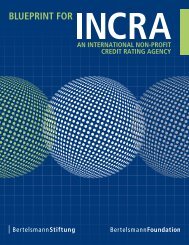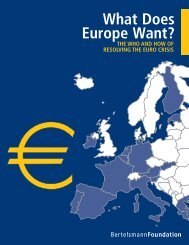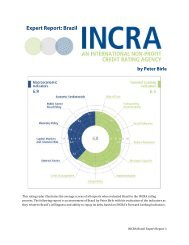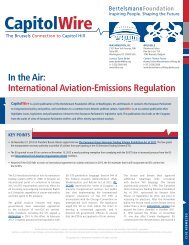BF-FieldManual-FEB13 -3.pdf - Bertelsmann Foundation
BF-FieldManual-FEB13 -3.pdf - Bertelsmann Foundation
BF-FieldManual-FEB13 -3.pdf - Bertelsmann Foundation
- No tags were found...
Create successful ePaper yourself
Turn your PDF publications into a flip-book with our unique Google optimized e-Paper software.
2. Prepare to grapple with Putin:The return of Putin to the Russianpresidency and the crackdowns ondissent raise immediate questionsover how relations will progress. Tohis domestic audience, Putin hasoften portrayed the US as a belligerenthegemon that acts counter to Russianinterests, sometimes using the US andNATO as scapegoats useful for whippingup nationalist fervor. The recent passageof legislation clamping down on politicalprotests, Internet freedom, and thefunding of Russian NGOs by foreigndonors is an attempt to eliminatepolitical opposition and reduce Westernengagement with Russian civil society,as seen in the recent eviction of USAIDstaff from the country.Yet Putin is also aware that Moscowcannot afford to ignore Europe and theUS. Russia has benefitted from Westerncooperation on many issues, such ascounterterrorism, and this is unlikelyto change under Putin. As internationalforces begin to draw down in Afghanistanpost-2014, Russia will be eager to workwith the US and Europe to ensurestability in northern Afghanistan and theSouthern Caucasus region. The Obamaadministration must work with Europeto create a common understanding withMoscow, one that takes the nationalinterests of both sides into account.Disagreements on global issues haveoften arisen because Russia felt itsnational interests were being ignored.In the Libya conflict, Putin’s contentionthat NATO overstepped the parametersof UN Security Council Resolution 1973spoke as much to Moscow’s concern overits economic interests in Libya as it didto concern over political sovereignty.On Syria, Putin has been steadfast inhis support of the Assad regime, inpart because the Russian naval base atTartus is one of its last remaining warmwateraccess ports. Recent comments byRussian officials suggest, however, thatthe Kremlin is preparing for the realitiesof a post-Assad Syria. 15 If the Obamaadministration can show that addressingthese issues is not a zero-sum gameand at least try to accommodateRussian concerns, it should find amore cooperative partner in Moscow ingeneral and Putin in particular. Europeand the US can entice Moscow intochanging its stance by guaranteeingRussia an important role in any post-Assad discussions.3. Understand today’sinternal dissent:While considering Moscow’s coreinterests is important, the US must alsotake great strides towards understandingand accommodating the new generationof Russian activists. The protests thatfollowed the parliamentary electionsin December 2011 and the presidentialelection in March 2012 demonstrateda widening chasm between thegovernment and the populace. Today’sactivists are no longer marginalizedliberal intelligentsia, but members of theyoung, urban middle class. The middleclass represents nearly 20 percent ofthe population and is expected to reach40 percent by 2020. 16 At the same time,a generation is coming of age that hasgrown up largely in the post-Soviet era.Of those who took part in the massiveprotest along Moscow’s ProspektSakharov on Dec. 24, 2011, 25 percentwere between the ages of 18 and 24, andmore than 50 percent were under 40. 17Today’s activists are nolonger marginalized liberalintelligentsia, but membersof the young, urbanmiddle class. The middleclass represents nearly 20percent of the populationand is expected to reach 40percent by 2020.Having accumulated wealth during theboom years from 2000 to 2008, Russia’smiddle class increasingly demandsmore political participation and greateraccountability and transparency fromgovernment institutions. Exposure toWestern countries through travel andbusiness, and widespread use of theInternet as a tool for communicationand knowledge, have fostered a growingdiscontent with the status quo. 18 Eventhe rural working class, one of Putin’smain bases of support, is increasinglydoubtful of the state’s ability toprovide health care and education andmaintain infrastructure. 19 If Russia’seconomic struggles continue, thedomestic situation will be prone tofurther fragmentation.The Obama administration, along withits European partners, should thereforework together to articulate a commonposition that takes the Kremlin’sforeign policy interests into accountwhile being assertive on political andhuman rights issues inside Russia. Bothsides have explored legislation (theso-called Magnitsky bills) that wouldbar the officials allegedly involved inthe death of Russian lawyer SergeiMagnitsky from entry into either the EUor US, with the US Congress recentlyapproving such legislation along withPermanent Normal Trade Relationstatus (PNTR) for Russia. The US shouldencourage European governments topass similar legislation in order to senda message to Kremlin officials and asa show of support to Russia’s growingactivist movement.4. Build upon the passageof PNTR by pursuing a broadermodernization agendawith Moscow:The recent passage of PNTR status forRussia by the US Congress highlightsthe potential growth of bilateral tradebut also its current shortcomings. WhileEurope and Russia maintain a large androbust trade relationship, economictrade and investment between the USand Russia has been relatively small,with Russia accounting for just 1.6% of USexports in 2011. 20 The passage of PNTRis expected to change that, bringinginnumerable benefits to US businesseswhile bringing US. companies intocompliance with WTO rules mandatingPNTR between members. US exports toRussia are forecast by some to doublefrom $9 billion in 2010 to nearly $19billion as WTO-mandated reductionson Russian tariffs are expected to createRussia6 7






